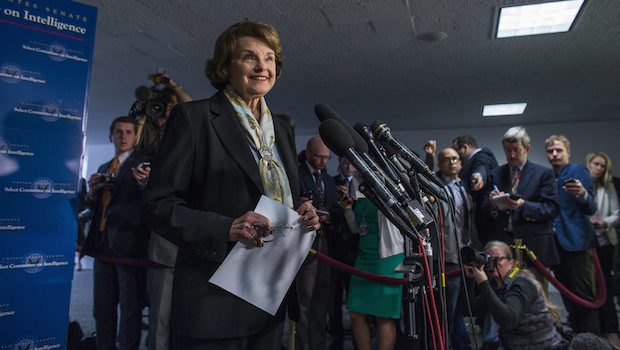
Democratic Senator from California Dianne Feinstein speaks to the media after a Senate Intelligence Meeting in the Hart Senate Office Building in Washington, DC, on April 3, 2014. (EPA/JIM LO SCALZO)
Washington, DC, Reuters—The US Senate Intelligence Committee voted on Thursday to declassify its long-awaited report on the CIA’s use of brutal interrogation methods that critics say amount to torture.
Senator Dianne Feinstein, a Democrat who chairs the committee, said the vote was 11–3 to declassify what she called the “shocking” results of investigating the Central Intelligence Agency practices under Republican President George W. Bush.
The vote to lift the blackout on the summary and recommendations of the 6,200-page report follows an unprecedented clash by Feinstein with the CIA, and would give the world its first official look at its regimen of interrogation and detentions in the aftermath of the September 11 attacks.
“The report exposes brutality that stands in stark contrast to our values as a nation. It chronicles a stain on our history that must never be allowed to happen again. This is not what Americans do,” Feinstein told reporters after the committee voted during a classified meeting.
It will still be weeks—if not longer—before any of the document is cleared for release.
Some committee Republicans voted with the Democrats in favor of declassifying the report, but it was clear there were bitter divides within the panel. The investigation began four years ago but was conducted only by Democrats. Republicans declined to participate because they felt it was too biased.
The three no votes were all from Republicans—Senators Dan Coats of Indiana, Marco Rubio of Florida and James Risch of Idaho. In a joint statement, Rubio and Risch called the report “one-sided and partisan” and said its release could endanger Americans overseas and risk US relations with other countries.
Georgia Republican Senator Saxby Chambliss, the panel’s vice chairman, said he voted for declassification “to get it behind us” and allow the public to make up its own mind.
He called the probe a waste of time and disputed assertions that the interrogation techniques had not helped to track down Osama bin Laden or others suspected of terrorism.
“There was information gleaned from this program which led not only to the takedown of bin Laden but to the interruption and disruption of other terrorist plots over a period of years,” Chambliss said.
Waterboarding
Congressional and intelligence sources said the report strongly condemned now-abandoned interrogation techniques such as “waterboarding” or simulated drowning, and concluded that they did not produce significant counter-terrorism breakthroughs.
The report is at the center of a bitter dispute between Feinstein and the spy agency over whether the CIA secretly monitored the panel’s investigation.
Feinstein, normally one of Congress’ strongest supporters of the intelligence community, accused the CIA in March of spying on Congress as it conducted the probe and possibly breaking the law.
And a top CIA lawyer complained to the Justice Department that Senate investigators accessed privileged agency records without proper authorization.
On Thursday, Feinstein said the report points to “major problems” with the CIA’s management of the interrogation program, and its interaction with the White House, Congress and other parts of government.
The Senate panel will now ask the White House to declassify the politically sensitive report.
An administration spokeswoman said President Barack Obama wanted this to happen as expeditiously as possible. Obama halted the interrogation program shortly after taking office in 2009.
“The president believes that bringing this program into the light will help the American people understand what happened in the past and can help guide us as we move forward, so that no administration contemplates such a program in the future,” spokeswoman Caitlin Hayden said in a statement.
Dean Boyd, the CIA’s director of public affairs, said the agency would act quickly. He said the agency had learned from the interrogation and detention program’s shortcomings and had taken corrective measures, but indicated it would not sign off on an inaccurate report.
The CIA has taken issue with some of the findings and has said the report contains factual errors.
“We owe it to the men and women directed to carry out this program to try and ensure that any historical account of it is accurate,” Boyd said.
Feinstein said she hoped the release would come quickly, perhaps in as soon as 30 days.
“That may be wishful thinking, but I hope not,” she said.
